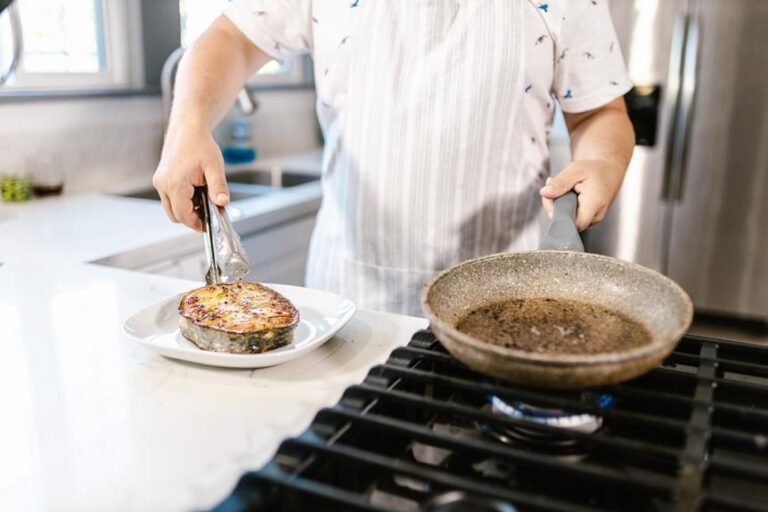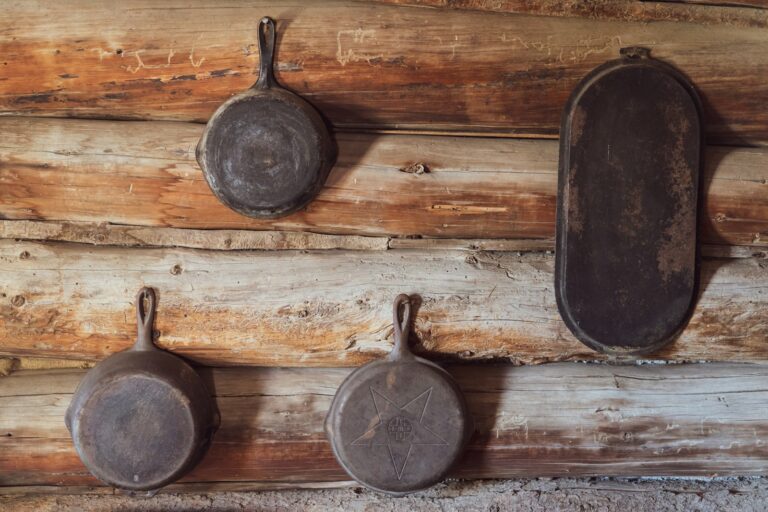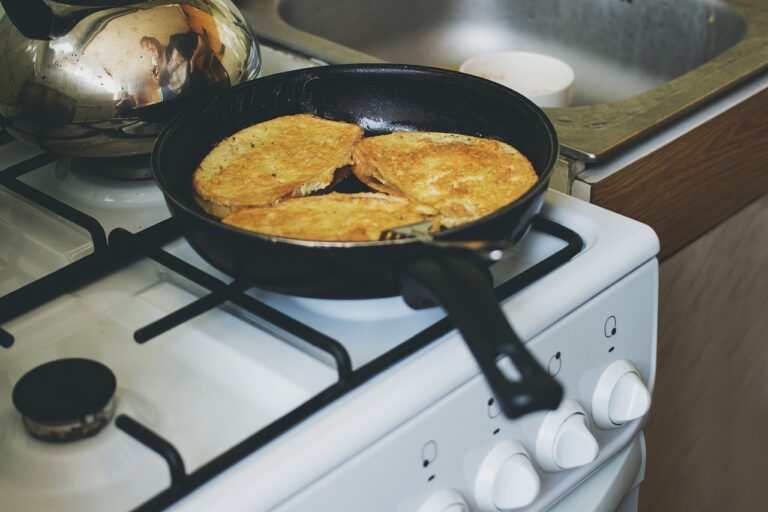I love cooking with copper pans. One of the best ways to ensure their longevity and performance is by seasoning them with oil.
In this article, I’ll share the benefits of seasoning copper pans, the types of oil you can use, and a step-by-step guide on how to do it properly.
I’ll also highlight common mistakes to avoid and provide tips for maintaining seasoned copper pans.
So let’s dive in and make our culinary adventures even more delicious!
Key Takeaways
- Seasoning copper pans with oil improves their non-stick properties.
- It enhances heat distribution and ensures uniform cooking without hot spots.
- Using the right type of oil with a high smoke point creates a durable non-stick surface.
- Regular cleaning and gentle handling help preserve the non-stick surface of seasoned copper pans.
Benefits of Seasoning Copper Pans
The benefits of seasoning copper pans include improved non-stick properties and enhanced heat distribution. When you season a copper pan, you create a natural non-stick surface that prevents food from sticking to the bottom. This makes cooking and cleaning much easier.
Additionally, seasoning helps to distribute heat evenly across the pan, ensuring that your food cooks more uniformly and avoids hot spots.
To season a copper pan, start by washing it thoroughly with warm soapy water to remove any dirt or residue. Then, dry it completely before applying a thin layer of oil to the interior surface. Spread the oil evenly using a paper towel or cloth, making sure to cover every inch of the pan.
Types of Oil for Seasoning Copper Pans
For optimal results, you should consider using different types of oil when seasoning your copper pans. The type of oil you choose can greatly affect the outcome of the seasoning process and the performance of your pans. Some oils work better than others due to their smoke point and ability to create a durable non-stick surface. After researching and testing various oils, I have found that the best oils for seasoning copper pans are coconut oil, flaxseed oil, and vegetable oil. These oils have high smoke points and are able to withstand high temperatures without breaking down or forming a sticky residue. Below is a table highlighting the properties of each oil:
| Oil | Smoke Point |
|---|---|
| Coconut Oil | 350°F |
| Flaxseed Oil | 225°F |
| Vegetable Oil | 400-450°F |
Step-by-Step Guide to Seasoning Copper Pans
To properly season your copper pans, follow these step-by-step instructions.
First, wash the pan thoroughly with warm water and mild soap. Dry it completely before moving on.
Next, apply a thin layer of oil to the inside surface of the pan using a paper towel or cloth. Make sure to cover every inch evenly.
Then, heat the pan on low heat for about 10 minutes to allow the oil to penetrate and create a protective barrier.
After that, let the pan cool down completely before wiping off any excess oil with a clean cloth.
Repeat this process two or three times to build up a durable seasoning layer.
Regularly seasoning your copper pans will not only enhance their performance but also prolong their lifespan. It’s worth investing in copper pans for your kitchen arsenal.
Keywords: copper pan care, benefits of using copper pans
Common Mistakes to Avoid When Seasoning Copper Pans
When it comes to seasoning copper pans, there are a few common mistakes that should be avoided. Two key points to consider are overheating and burning, as well as using the wrong oil.
Overheating can lead to discoloration and damage, while using the wrong oil can affect the seasoning process and even leave a residue on your food.
Overheating and Burning
Be careful not to overheat the copper pan, as it can easily burn and ruin the seasoning. Overheating hazards are a common concern when working with copper pans, but with proper temperature control, you can avoid these issues.
Here are three important points to remember:
- Use low to medium heat: Copper conducts heat quickly, so there’s no need to crank up the burner. Start with low to medium heat and adjust as needed.
- Preheat gradually: Allow the pan to warm up slowly before adding any oil or food. Rapidly heating the pan can cause hot spots and lead to burning.
- Monitor cooking time: Keep an eye on your food while it cooks in the copper pan. Avoid leaving it unattended for too long, as this increases the risk of overheating and burning.
Using the Wrong Oil
Using the wrong type of oil in your copper pan can lead to undesirable results. I learned this the hard way when I used olive oil instead of a high smoke point oil like avocado or vegetable oil. The consequences were disastrous – the olive oil burned and left a sticky residue on my pan that was nearly impossible to remove. It ruined the seasoning and made cooking a nightmare. After some research, I discovered alternative oils that are better suited for seasoning copper pans, such as flaxseed or grapeseed oil. These oils have higher smoke points and create a durable, non-stick surface on the pan. Lesson learned: always use the right type of oil to avoid ruining your copper pan’s seasoning.
| Oil Type | Smoke Point (°F) | Best For |
|---|---|---|
| Avocado | 520 | High heat cooking |
| Vegetable | 400-450 | General cooking |
| Grapeseed | 420 | Stir-frying |
Table: Smoke Points of Alternative Oils
Tips for Maintaining Seasoned Copper Pans
Here’s a tip for maintaining seasoned copper pans: regular cleaning and gentle handling will help preserve the nonstick surface. As someone who loves cooking with copper cookware, I’ve learned a few tricks to keep them in top shape.
Here are three important things to remember when it comes to maintaining and cleaning copper pans:
- Avoid using abrasive cleaners or scrubbers that can damage the nonstick coating. Instead, opt for gentle dish soap and a soft sponge.
- After each use, make sure to dry your copper pan thoroughly to prevent any moisture from causing tarnish or corrosion.
- To keep your pan looking shiny and new, periodically polish it with a mixture of vinegar and salt.
Frequently Asked Questions About Seasoning Copper Pans
When it comes to seasoning copper pans, a common question that arises is what oil works best. In this discussion, I will explore the different options and provide recommendations based on personal experience.
Additionally, I will address how often one should season their copper pans and whether or not butter can be used as an alternative.
Best Oil for Seasoning
The best oil for seasoning copper pans is usually vegetable or flaxseed oil. These oils have a high smoke point, which means they can withstand high temperatures without breaking down and causing an unpleasant smell or taste. Additionally, vegetable and flaxseed oils offer several health benefits when used for seasoning.
Here are three reasons why they are the top choices:
- They contain heart-healthy fats: Both vegetable and flaxseed oils are rich in omega-3 fatty acids, which promote cardiovascular health and reduce inflammation.
- They are low in saturated fats: Compared to other oils like coconut or palm oil, vegetable and flaxseed oils have lower levels of saturated fats, making them a healthier option for frying.
- They provide antioxidant properties: These oils contain natural antioxidants that help protect against damage caused by free radicals in the body.
How Often to Season
To maintain the quality of your seasoned cookware, you should regularly reapply oil to ensure proper protection and prevent any potential damage.
When it comes to copper pans, cleaning them properly is crucial. To clean copper pans, start by washing them with warm water and mild dish soap. Avoid using abrasive cleaners or scrubbers that can scratch the surface. After cleaning, dry the pan thoroughly to prevent any moisture from causing rust or corrosion.
Once the pan is clean and dry, it’s time to apply a thin layer of oil. This not only helps in maintaining the non-stick properties but also adds a protective layer against oxidation and tarnishing.
The benefits of using copper pans are numerous – they heat up quickly and evenly, providing excellent heat distribution for precise cooking results. Additionally, they are durable and aesthetically pleasing, adding a touch of elegance to your kitchen.
Can I Use Butter?
You can definitely use butter to add flavor and prevent sticking when cooking with copper pans. Butter has a rich taste that can enhance the flavors of your dishes. It also contains natural fats that help create a non-stick surface on your pan. However, there are other options you can consider as well.
Here is a list of alternative oils for seasoning copper pans:
- Olive oil: This oil is known for its high smoke point, making it ideal for high-temperature cooking.
- Vegetable oil: Another versatile option, vegetable oil works well for seasoning copper pans.
- Coconut oil: With its natural anti-bacterial properties, coconut oil is a popular choice for seasoning.
While butter is a great option, using margarine may not be recommended due to its lower smoke point and higher water content. It’s important to choose an oil or fat with a higher smoke point to ensure proper seasoning and prevent food from sticking to the pan.
Conclusion
In conclusion, seasoning copper pans with oil is a simple and effective way to enhance their performance and longevity. By following the step-by-step guide and avoiding common mistakes, you can ensure that your copper pans are properly seasoned for optimal cooking results.
Additionally, regularly maintaining seasoned copper pans will help them remain in excellent condition over time. So go ahead and give your copper pans some love with a good seasoning, and enjoy the benefits of cooking with these beautiful and efficient kitchen tools!


